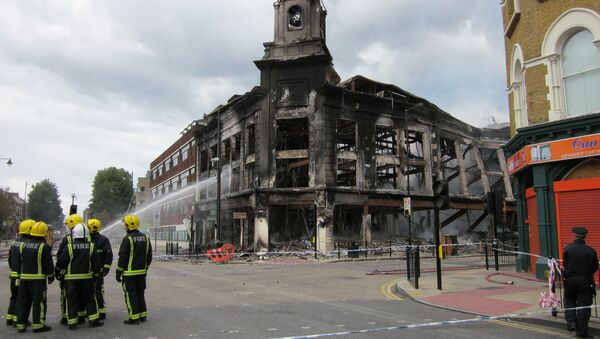A memo which has remained secret for 26 years reveals how the UK government reacted in 1991 when it became clear the convictions of three men for the murder of PC Keith Blakelock may be thrown out.
The note, written by Andrew Turnbull, the Principal Private Secretary to then Prime Minister John Major, appears to be a minute of a meeting with the Home Secretary, Kenneth Baker, about the situation regarding the so-called Tottenham Three.
Winston Silcott, Mark Braithwaite and Engin Raghip had been convicted of the murder of PC Blakelock, during a riot on the Broadwater Farm estate in Tottenham, north London in 1985.
It was a shocking crime which reverberated across Britain but almost as soon as the three were convicted in 1987 campaigners claimed it was a miscarriage of justice.
Case Referred Back to Appeal Court
The Home Secretary, Kenneth Baker, had decided to suspend Detective Chief Superintendent Graham Melvin and refer the case back to the Court of Appeal.
"The Prime Minister said this would further weaken public confidence in the police and he asked whether there were further measures the government needed to take to restore confidence," writes Mr. Turnbull.
"The Home Secretary said he had already set up the Royal Commission under Lord Runciman. One of its areas of study would be uncorroborated confessions. Nevertheless, he would examine what more could be done and what was needed to publicize the actions which had already been taken," added Mr. Turnbull.
The riot broke out on October 6, after details emerged of the death of Cynthia Jarrett, a 48-year-old Jamaica-born woman who collapsed and died of a heart attack after police raided her house looking for her son Floyd.
A week earlier police had shot and paralyzed another innocent black woman, Cherry Groce, during a raid in south London, sparking riots in Brixton.
Relations between London's Afro-Caribbean community and the overwhelmingly white Metropolitan Police were at an all-time low.
Unarmed Police Unit Clashed With Rioters
PC Blakelock and his unit, armed with riot shields and batons but no guns, were sent onto the notorious Broadwater Farm estate to combat gangs of youths who were setting fire to parked cars.
He stumbled and fell under a hail of stones and was then hacked to death by a mob of youths.
There was no CCTV footage of the attack and the police had nothing to go on but hearsay.
Dozens of homes on the estate were raided, 369 people were arrested but police faced a wall of silence from local residents.
Remembering our colleague PC Keith Blakelock, of the Metropolitan Police, murdered on duty on this day in 1985 #LestWeForget pic.twitter.com/pN1Tp5gpFn
— Met Police Fed (@MPFed) 6 October 2017
In 1987 six people stood trial for PC Blakelock's murder.
Silcott, Braithwaite and Raghip were convicted on the basis of disputed confessions and on remarks — known among police and criminals as "verbals" — which officers claimed he had said.
Tottenham Three Supported by a Young Jeremy Corbyn
Among those campaigning for their exoneration was Labour MP Jeremy Corbyn, now the party's leader but then a left-wing maverick.
Lest we forget
— Stafford Scott (@StaffordScott_) 7 October 2017
We stood up and they fell down✊🏾 #BroadwaterFarmUprising #CynthiaJarrett #TottenhamThree #WinstonSilcott #NickyJacobs #NJNP✊🏾 https://t.co/auK8aaYpZw
"The campaign and campaigners have been vindicated after the long struggle we have had for justice," said the area's Labour MP Bernie Grant, when the Tottenham Three were cleared.
Earlier this month Sputnik reported on a murder which took place near the Bernie Grant Arts Centre in Tottenham.
Detective Chief Superintendent Melvin and another officer were acquitted in 1994 of fabricating evidence.
Silcott remained in prison until 2003 because he had also been convicted of murdering a boxer, Anthony Smith, at a party several months before the riots.
A Fourth Man Was Cleared of Murder in 2014
In 2014 Nicholas Jacobs, 45, went on trial for the murder of PC Blakelock but he was found not guilty.
Three witnesses told the trial at the Old Bailey they saw Mr. Jacobs — who was 16 at the time — attack PC Blakelock, but his lawyer suggested they were not credible.
One week ago @MPSHaringey remembered PC Keith Blakelock. Read more about our memorial service in this week's @HamandHigh pic.twitter.com/Fn93u4Fscy
— MPS Haringey (@MPSHaringey) 13 October 2017
PC Blakelock's widow, Elizabeth, wept in court and one of his three sons held his head in his hands.
To date nobody has been brought to justice for the murder.
The 1980s and early 1990s was a period when several high-profile miscarriages of justice came to light, including the Birmingham Six, the Guildford Four, the Bridgewater Four and the Cardiff Three.
Another case, the M25 Three, was exposed in 2000 and one of the three men who were wrongly convicted of murder, Raphael Rowe, went to work as a journalist with the BBC before being "pushed out" last year.



